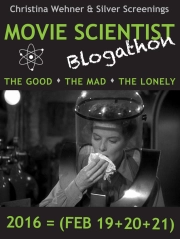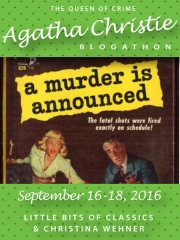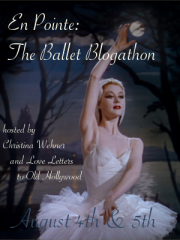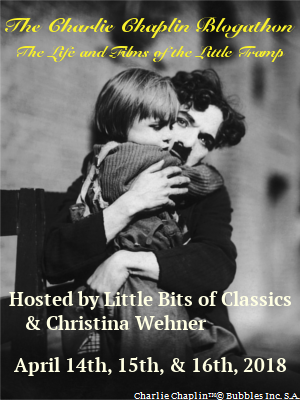 1937 was an important year for Cary Grant, appearing in both The Awful Truth and Topper and establishing his persona as a comedian. However, he also made two other movies that year, one of which is The Toast of New York, where he plays an earnest second fiddle to Edward Arnold’s larger-than-life Robber Baron James Fisk.
1937 was an important year for Cary Grant, appearing in both The Awful Truth and Topper and establishing his persona as a comedian. However, he also made two other movies that year, one of which is The Toast of New York, where he plays an earnest second fiddle to Edward Arnold’s larger-than-life Robber Baron James Fisk.
In fact, it’s very interesting to see Cary Grant be so earnest (partly in the role of earnest lover)…at least when he’s not gleefully assisting Edward Arnold in fleecing other wealthy robber barons like Daniel Drew and Cornelius Vanderbilt. Grant also makes for an exceptionally handsome earnest lover, but clearly a slight adjustment of persona was needed to finally put him over the top.
The Toast of New York is a very odd film to have been released during the Great Depression. It seems to celebrate swindlers, only to pull back in the last twenty minutes or so to warn against excessive swindling. Is that the point? It’s okay to hustle a little money for yourself and cheat other hustlers, but don’t get too big for your britches and cause the collapse of the entire economic system.
The star of the film is unquestionably Edward Arnold as James Fisk. The film begins with Fisk and his two sidekicks, Nick (Cary Grant) and Luke (Jack Oakie) helping him to buy cotton in the South during the Civil War, to smuggle the cotton across the border into the North and sell it for a profit. By the end of the war, they are broke, however, owing to some very ill-advised investments by Luke. Nothing daunted, Fisk then proceeds to swindle the skinflint Quaker robber baron Daniel Drew (Donald Meek) into sharing the Erie Railroad and soon Fisk is locking horns with Drew’s rival, Cornelius Vanderbilt (Clarence Kolb).
Fisk is also in love with an ambitious entertainer named Josie Mansfield (Frances Farmer), who Fisk is determined to make a star. She likes Fisk and owes him everything, but is really attracted to Nick, who is also attracted, but trying his best to throw cold water on her so not to betray his friend. The film ends with a love triangle, while Fisk goes a little Napoleonic on everyone and tries to corner all the gold in the market, saying that the little people don’t matter – he’s above them all.
This is partly where the film gets into trouble. Fisk is presented as a rather lovable old scoundrel and it’s hard to buy his sudden descent into Napoleonic power mongering. And it’s never clear if we’re supposed to be cheering for these people or not. Cary Grant is left in the slightly awkward role of both sidekick and moral conscience, which he does inhabit with flair. In fact, the film can’t seem to decide whether or not it’s a romp through the Gilded Age or a more serious drama about the abuses of the robber barons.
Edward Arnold, it must be said, also inhabits his role with flair. His is the pathos and comedy – the rest are supporting players. Though I have to admit his character is an odd one for the times. He even wears a uniform and has his own regiment, protecting his house and trying to rise above the little people. How did this not look like fascism in 1937? I kind of lovable fascism? It seems to hearken to a later, far more sinister role for Arnold with J.P. Norton in Meet John Doe.
Frances Farmer as Josie Mansfield also seems to inhabit a rather odd place in the film. She’s supposed to be ambitious, accepting favors from Fisk and getting ahead in her career on the strength of his influence alone, and yet she’s not nearly hardcore enough to make us quite believe the character. Apparently Frances Farmer did argue for tweaking the role a little, but she was largely ignored.
The real story of James Fisk and Josie Mansfield is actually far more interesting and would have made a fascinating movie, though not a particularly edifying one. The real Fisk was an associate of perhaps the ultimate Robber Baronl, Jay Gould (who seems to have disappeared in the movie), and together they tried to corner gold. But unlike the movie, neither man was ruined by the venture and actually emerged richer than ever. Fisk was married, but enjoyed a number of affairs, most openly and famously with Josie Mansfield. But when she fell in love with a younger associate of Fisk’s, she tried to blackmail Fisk into giving her a settlement. When Fisk refused, Josie Mansfield’s new lover shot Fisk dead.
So if the movie had been closer to real life, Frances Farmer should have tried to blackmail Edward Arnold and Cary Grant should have shot him. Instead, Arnold dies rather heroically, surrounded by his friends and the woman he loves.
Some of the events in the movie did really happen, though. Fisk’s tussles with Vanderbilt, his flight to New Jersey to avoid getting arrested, the attempts to corner the gold market.
I had read that Cary Grant could not make effective period movies, that he didn’t look quite right in period garb. This must be select period garb, because he looks fine in The Toast of New York. He looks very handsome indeed. It must depend on the period films. I guess Gunga Din is period, too. I can’t think of any others, though, that I have seen him in. It’s nearly impossible to imagine him in films set in ancient Greece or Rome (Cary Grant in a toga?) or the Medieval period. Perhaps he had a limit of sixty, seventy years into the past. 🙂 I have to remind myself that the 1860s wasn’t really that long ago in 1937. Like WWII is for us.
This post is part of The Cary Grant Blogathon, hosted by Phyllis Loves Classic Movies. Click here for more entires about him!










Michaela
December 1, 2016 at 7:05 pm
Sometimes I forget that I haven’t seen all of Cary Grant’s films. His earlier ones are particularly unknown to me, meaning I know the titles but I haven’t seen them yet. I can’t recall seeing Cary in a period film (unless you count Gunga Din, as you pointed out). I always hear people say that he didn’t do well in them, but it’s hard to imagine Cary ever being bad.
LikeLiked by 1 person
christinawehner
December 2, 2016 at 8:01 am
Yes, I know what you mean about his earlier films. And in the few I’ve seen him in, it always takes me aback that he’s not the lead. 🙂
True…he’d be worth watching in nearly anything!
LikeLike
Lê
December 2, 2016 at 11:51 am
I need to see this film! No matter if it’s meh, I want Cary Grant in period clothes! I’m right now imagining him wearing a toga or a gladiator uniform, and I’m quite sure that he wears an armor in The Bachelor and the Bobby-Soxer.
Thnaks for presenting this movie to me!
Kisses!
Le
LikeLiked by 1 person
christinawehner
December 2, 2016 at 12:05 pm
You’re right – I totally forgot about the suit of armor in The Bobby-Soxer! He even won Myrna Loy’s heart in that suit of armor, so it must have worked out well for him.
The Toast of New York is definitely worth a watch for Cary Grant fans. His period clothes don’t look too radically different from what they were wearing in the 1930s, but it was still interesting to see. That would have been so interesting to see him in a gladiator uniform, though!
LikeLike
FictionFan
December 3, 2016 at 4:39 am
Personally I’d have paid good money to see him in a toga… 😉
LikeLiked by 1 person
christinawehner
December 3, 2016 at 7:41 pm
It would have been something to see 🙂
LikeLiked by 1 person
Patricia Nolan-Hall (@CaftanWoman)
December 3, 2016 at 6:46 am
It is an odd movie, but I’ll watch anything with Edward Arnold.
I think when folks speak disparagingly of Grant in period clothing they are thinking of The Howards of Virginia. It is set in the Revolutionary War period and Grant’s character is not particularly appealing which may add to the distaste.
LikeLiked by 1 person
christinawehner
December 3, 2016 at 8:02 pm
Yes, I agree – Edward Arnold is always worth seeing!
That is very interesting about The Howards of Virginia. And about his character. It sounds like a highly unusual role for him.
LikeLike
Silver Screenings
December 4, 2016 at 6:20 am
I want to see this film for all the paradoxes you pointed out. I wonder if the last 20 minutes was the studio appeasing the Production Code?
At any rate, this film has a terrific cast. Thanks for putting it on my radar! 🙂
LikeLiked by 1 person
christinawehner
December 4, 2016 at 5:57 pm
That’s a good point about the code. You’re right – it probably would have been difficult to put the real story into a movie at that time.
The cast is first rate! It is definitely worth seeing for fans of the actors (and Donald Meek fans, too). 🙂
LikeLiked by 1 person
Phyl
December 6, 2016 at 9:35 am
I had no idea the film was about a real person! This was a wierd film, seeing Grant as a supporting actor. And it definitely ran a little long for me but was still worth the watch.
The Howard’s of Virginia is a Revolutionary War film and Grant looks pretty awful in it.
Thanks for highlighting this lesser known film for the Blogathon!!
LikeLiked by 1 person
christinawehner
December 6, 2016 at 10:50 am
Yeah, it is pretty odd watching him defer to another lead actor!
Revolutionary War? Admittedly, it’s hard for me to imagine him in a film of that period. I wonder how he ended up in that! Thanks for telling me about it!
LikeLike
Phyl
December 7, 2016 at 2:36 pm
Maybe he lost a bet 😉
LikeLiked by 1 person
christinawehner
December 7, 2016 at 3:08 pm
Ha ha! That sounds plausible. 🙂
LikeLike